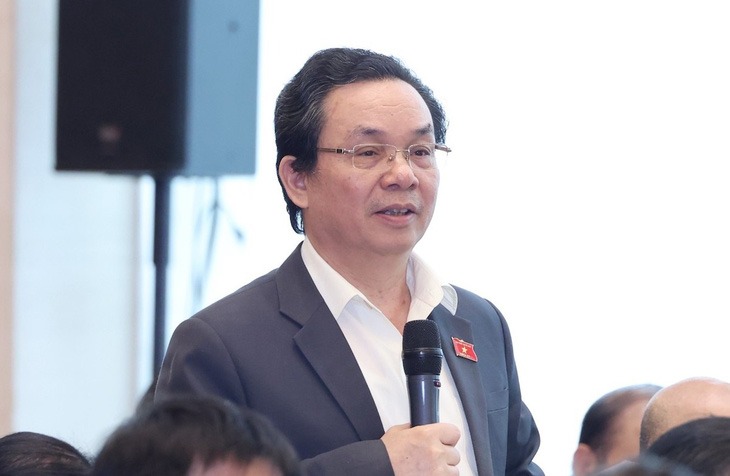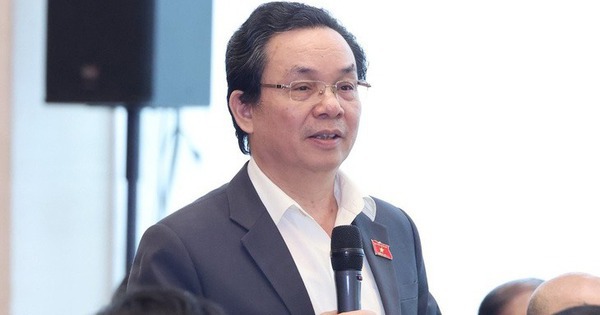“Golden Land on Both Sides of the Red River: Neglected and Plagued with Issues”
Introduction
The development of the “golden land” on both sides of the Red River has been a topic of concern and debate among the members of the National Assembly of Vietnam. In a recent session, Hoang Van Cuong, a member of the National Assembly from Hanoi, expressed his views on the matter. This article will delve into the issues surrounding the development of the “golden land” and the need for specific regulations to address the challenges it poses.

Caption: Hoang Van Cuong, member of the National Assembly, addressing the issue
Development Challenges and Unique Characteristics of Hanoi
Hanoi, as the capital city, is a unique administrative entity with both urban and rural areas. However, the rural areas within the city also need to adhere to specific standards and regulations. Hoang Van Cuong emphasizes the importance of recognizing the distinction between Hanoi as a whole and the rural areas within it, both in terms of management functions and roles.
“It is crucial to establish the concept of the capital city and empower the Hanoi City People’s Council to determine the special powers and policies that surpass those of the districts and communes,” suggests Cuong.
Cuong further emphasizes the need to establish clear guidelines for utilizing the potential of the Red River, including its banks and surrounding areas. He envisions the Red River as a beautiful landscape and a bustling hub of activities in the city, promoting commercial and service development.
“Unfortunately, both sides of the Red River are currently neglected, undeveloped, and plagued with social issues due to the inability to utilize this prime location, primarily due to flood prevention measures on the Red River and the Thai Binh River. As a result, these “golden lands” in Hanoi have become wastelands similar to uncultivated fields in other provinces,” lamented Cuong.
Concerns about Legal Complications and Eminent Domain
One of the main concerns raised during the discussion is the potential for legal complications and disputes if the Hanoi City Government resorts to eminent domain to reclaim land for urban redevelopment projects. Tran Van Lam, a member of the National Assembly’s Financial and Budget Committee, expressed his concerns about possible lawsuits if the District-level People’s Committees are authorized to forcibly acquire land when two-thirds of households disagree with the project.
Lam considers this to be a significant issue that has previously sparked controversies during the amendment of the Land Law. In densely populated residential areas, where one-third of households do not agree with the project, using eminent domain to clear land can have significant social implications, especially in terms of legal disputes.
Therefore, Lam suggests that the drafting committee carefully assesses the potential policy implications and anticipates any complex consequences, particularly when the decision to use eminent domain lies with the district-level authorities.
In response, Hoang Van Cuong argues that land reclamation by district-level authorities for urban redevelopment projects is not a new concept. However, the draft of the revised Capital Law introduces a unique condition whereby land can only be reclaimed if two-thirds of residents agree.
Cuong argues that if 100% consent is required, it would be difficult to implement urban redevelopment projects in reality. For example, if one household on the ground floor of an old apartment building does not agree, the entire building cannot be demolished. “As the capital city, Hanoi needs specific policies. This is necessary. Without explicit regulations, urban redevelopment projects cannot be realized,” explains Cuong.
The proposal of two-thirds consent for land reclamation for urban redevelopment projects, as outlined in the draft, does not pose a risk of lawsuits, according to the Hanoi delegation of the National Assembly. They clarify that it only applies to urban redevelopment projects and does not involve the reclamation of agricultural land for commercial or service projects.
These were some of the key discussions and concerns raised during the fifth specialized session of the National Assembly. The session focused on eight draft laws, including the Capital Law (revision), the Organization of People’s Courts Law (revision), the Social Insurance Law (revision), the Road Law, the Traffic Order and Safety Law, the Defense Industry, Security, and Mobilization Industry Law, the Archives Law (revision), and the amendment and supplementation of certain provisions of the Asset Auction Law.
Business Today is your go-to source for the most insightful news and updates on finance and economics. Visit Business Today for more information.

